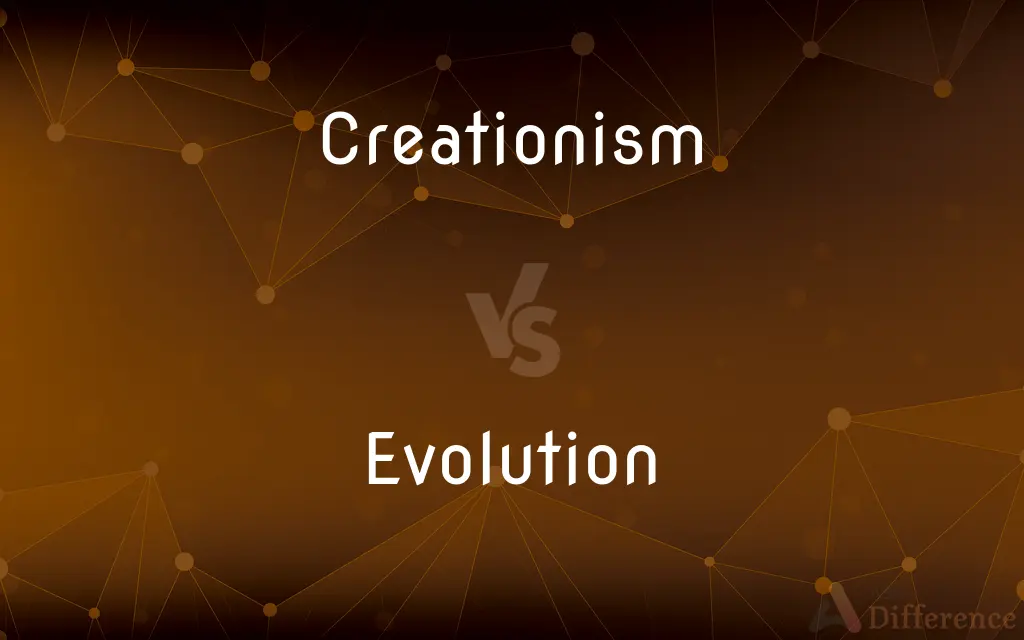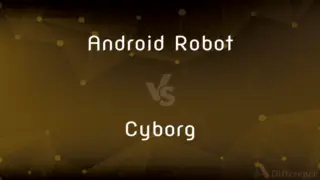Creationism vs. Evolution — What's the Difference?
By Maham Liaqat & Urooj Arif — Published on February 29, 2024
Creationism posits that the universe and life originated from specific acts of divine creation, while evolution is the scientific theory that species have developed over time through natural selection and genetic variation.

Difference Between Creationism and Evolution
Table of Contents
ADVERTISEMENT
Key Differences
Creationism is rooted in religious beliefs, particularly those found in various religious texts, and suggests that the universe and all forms of life were created by a divine being or beings. This perspective can vary significantly among different religions and denominations, ranging from young Earth creationists, who interpret the biblical account of Genesis literally and believe the Earth is only a few thousand years old, to those who accept some aspects of scientific findings but attribute the initial spark of life to divine intervention.
Evolution, on the other hand, is based on scientific research and evidence. It was first formulated by Charles Darwin in the 19th century and has been supported by extensive biological research since. The theory of evolution by natural selection explains how species adapt and change over time due to variations in traits, competition for resources, and environmental pressures. It does not address the origin of life itself but rather the diversity and complexity of life that has arisen since.
The debate between creationism and evolution often centers around educational curricula, with some advocating for creationist teachings in schools alongside or in place of evolutionary biology. This debate is particularly prominent in regions where religious beliefs strongly influence social and political life.
Creationism is based on faith and religious doctrine, while evolution is supported by empirical evidence from multiple scientific disciplines, including genetics, paleontology, and comparative anatomy. The two viewpoints can represent fundamentally different understandings of human origins, life on Earth, and the workings of the universe.
Some individuals and groups attempt to reconcile these views, advocating for theistic evolution, which suggests that evolutionary processes are the means by which a divine power created life. This perspective tries to bridge the gap between scientific understanding and religious beliefs.
ADVERTISEMENT
Comparison Chart
Basis
Religious beliefs and texts.
Scientific evidence and research.
Key Beliefs
Life and the universe were created by a divine being.
Species evolve over time through natural selection.
Origin of Life
Divine creation at a specific point in time.
Natural processes without specifying initial origin.
Age of the Earth
Often believed to be young (thousands of years).
Estimated at about 4.5 billion years based on scientific evidence.
Educational Debate
Advocated by some to be taught in schools.
Widely accepted and taught in scientific education.
Compare with Definitions
Creationism
Intelligent design.
Some creationists propose intelligent design as an explanation for life's complexity, attributing it to a higher power.
Evolution
Natural selection.
Evolutionary theory suggests species adapt over generations through natural selection, where beneficial traits become more common.
Creationism
Young Earth perspective.
Young Earth creationists argue that geological and fossil records should be interpreted within a biblical timeline.
Evolution
Fossil evidence.
The fossil record, showing gradual changes in species over time, is a key evidence supporting evolution.
Creationism
Belief in divine creation.
Creationists may believe that the Earth and all its creatures were created in six days, as described in Genesis.
Evolution
Common descent.
Evolution posits that all life on Earth shares a common ancestor, with diversity arising through branching and speciation.
Creationism
Literal interpretation of texts.
Literal creationists adhere closely to the specific creation accounts found in religious scriptures.
Evolution
Scientific consensus.
Evolution is widely accepted by the scientific community as the foundational theory of biological sciences.
Creationism
Debate over school curricula.
Creationists have lobbied for the inclusion of creationism in science classes as an alternative to evolution.
Evolution
Genetic research.
Modern genetics has revealed similarities in the DNA of different species, supporting the theory of common descent.
Creationism
Belief in the supernatural origin of the universe or of humans and other living things, especially as based on the literal interpretation of the account of the creation related in the Bible.
Evolution
(biology) the sequence of events involved in the evolutionary development of a species or taxonomic group of organisms.
Creationism
Any creationary belief, especially a belief that the origin of things is due to an event or process of creation brought about by the deliberate act of any divine agency, such as a Creator God (creator god).
Evolution
A general name for the history of the steps by which any living organism has acquired the morphological and physiological characters which distinguish it; a gradual unfolding of successive phases of growth or development.
Common Curiosities
Can creationism and evolution coexist?
Some people believe in theistic evolution, which tries to reconcile religious faith with scientific understanding by suggesting that evolutionary processes were guided by a divine being.
What is intelligent design?
Intelligent design is a form of creationism that argues some features of the universe and living things are best explained by an intelligent cause, not an undirected process such as natural selection.
Are there different types of creationism?
Yes, there are various forms, including young Earth creationism, old Earth creationism, and intelligent design, each with different interpretations of the creation account and the age of the Earth.
Why is evolution widely accepted in the scientific community?
Evolution is supported by a vast body of evidence from various scientific fields, including genetics, paleontology, and biology, making it a cornerstone of modern science.
How do schools typically handle the teaching of creationism and evolution?
In many parts of the world, evolution is taught as part of the science curriculum, while creationism, if included, is often discussed in religious or philosophy classes rather than as a scientific theory.
What role do mutations play in evolution?
Mutations introduce genetic variations, some of which may provide advantages under certain environmental conditions, contributing to the evolutionary process.
How do creationists explain the diversity of life?
Creationists often attribute the diversity of life to the original act of creation, suggesting that all forms of life were created with the ability to adapt within certain limits.
What are some common misconceptions about evolution?
Misconceptions include the idea that evolution is just a "theory," that it implies humans evolved from monkeys, and that it occurs in a linear, purposeful manner rather than through random mutations and selection.
How does the theory of evolution impact medical research?
Understanding evolutionary biology helps in areas like antibiotic resistance, the spread of viruses, and the development of treatments by considering the evolutionary history of pathogens and humans.
How does the fossil record support evolution?
The fossil record provides chronological evidence of species changing over time, with transitional fossils showing intermediate forms linking different groups of organisms.
Is it possible to believe in evolution and still have religious faith?
Many people find ways to reconcile their religious beliefs with the scientific theory of evolution, viewing the natural processes of evolution as part of the divine order.
What criticisms do creationists have of the theory of evolution?
Creationists often question the completeness of the fossil record, the mechanisms of natural selection, and the ability of evolution to explain complex biological structures.
Why do some religious groups accept evolutionary theory?
Some religious groups view scientific findings, including evolution, as revealing the mechanisms through which a divine power created and sustains the natural world, thus seeing no conflict between their faith and science.
What evidence do scientists use to estimate the age of the Earth?
Scientists use radiometric dating of rocks and minerals, including meteorites and lunar samples, to estimate the Earth's age at about 4.5 billion years.
Can theistic evolution be considered a scientifically valid perspective?
While theistic evolution attempts to reconcile religious beliefs with evolutionary science, it is not a scientific theory itself because it invokes supernatural intervention, which falls outside the scope of scientific inquiry.
What role does genetic variation play in natural selection?
Genetic variation within a population is crucial for natural selection, as it provides the raw material upon which selective forces can act, leading to adaptations and eventual speciation.
How do creationist views vary internationally?
Creationist views can vary widely around the world, influenced by cultural, religious, and educational factors, with some countries emphasizing religious teachings and others adhering more strictly to secular, scientific perspectives in education.
How do scientists use molecular biology to study evolution?
Scientists use molecular biology to examine genetic similarities and differences among species, trace lineage through DNA, and understand the genetic changes that underpin evolutionary processes.
What is punctuated equilibrium in evolutionary theory?
Punctuated equilibrium is a theory suggesting that species remain relatively stable for long periods, with significant evolutionary changes occurring in relatively short, intense bursts, often tied to speciation events.
Share Your Discovery

Previous Comparison
Android Robot vs. Cyborg
Next Comparison
Write vs. WriteLineAuthor Spotlight
Written by
Maham LiaqatCo-written by
Urooj ArifUrooj is a skilled content writer at Ask Difference, known for her exceptional ability to simplify complex topics into engaging and informative content. With a passion for research and a flair for clear, concise writing, she consistently delivers articles that resonate with our diverse audience.
















































